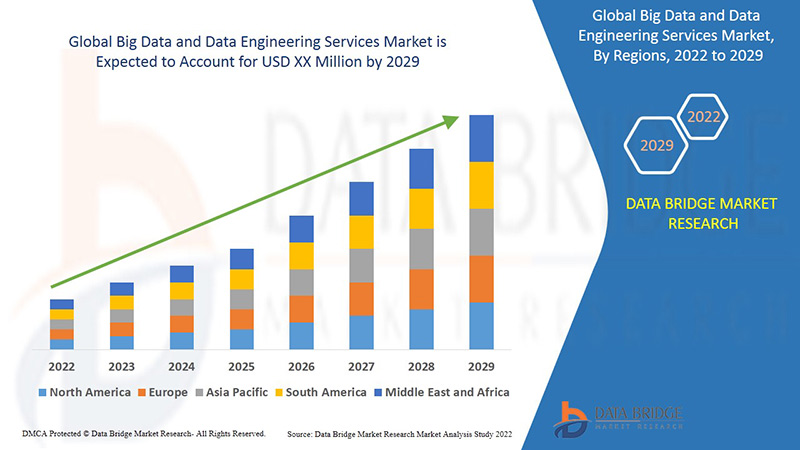Introduction
In today’s digital economy, data has emerged as one of the most valuable assets for businesses. Companies that effectively harness, analyze, and leverage data have a distinct advantage over competitors. However, with the explosion of big data, organizations face challenges in handling massive volumes of information, integrating disparate data sources, and turning raw data into actionable insights. Big Data and Data Engineering Services offer the expertise, technology, and infrastructure that organizations need to manage complex data landscapes and unlock the value hidden within.
This blog will explore what big data and data engineering services entail, how they benefit businesses, and the role they play in driving growth and innovation.
What is Big Data?
Big data refers to the vast volumes of structured and unstructured data generated by people, machines, and processes in real-time. This data is characterized by the three Vs:
- Volume: The sheer scale of data generated is enormous, ranging from terabytes to zettabytes.
- Velocity: Data is produced at a rapid pace and often needs to be processed quickly.
- Variety: Data comes in multiple formats, including text, images, videos, and sensor data, making it challenging to integrate and analyze.
With advancements in technologies like cloud computing, machine learning, and IoT devices, the amount of data available to businesses is continuously expanding. However, big data is only valuable if it can be processed, organized, and interpreted. This is where data engineering services come in.
What are Data Engineering Services?
Data engineering involves designing, building, and maintaining data pipelines that transform raw data into formats that can be readily analyzed. Data engineers are the architects of data systems, ensuring data is accurate, accessible, and usable for analytics and decision-making processes.
Key components of data engineering services include:
- Data Collection and Integration: Aggregating data from various sources, including databases, APIs, and external sources, and ensuring seamless data integration.
- Data Pipeline Development: Automating workflows that move data from one stage to another, from ingestion to transformation and storage.
- Data Storage and Management: Using data warehouses, data lakes, or cloud-based storage solutions to store and manage data efficiently.
- Data Transformation: Cleaning, filtering, and structuring data into an analysis-ready format.
- Data Governance and Quality Control: Ensuring data accuracy, security, and compliance with regulations.
- Real-Time Data Processing: Handling real-time data streams to enable quick decision-making for business-critical applications.
Data engineering services provide businesses with a foundation to support big data analytics, artificial intelligence (AI), and business intelligence (BI) applications.
The Benefits of Big Data and Data Engineering Services
Investing in big data and data engineering services can unlock multiple benefits for businesses across various industries:
1. Enhanced Decision-Making
By converting raw data into actionable insights, big data solutions help businesses make more informed decisions. Data engineering services enable real-time analytics, allowing decision-makers to respond to market changes and customer demands swiftly.
2. Operational Efficiency
Data engineering streamlines workflows and automates repetitive data processing tasks. By automating data collection, cleaning, and integration processes, organizations save time and reduce errors, leading to more efficient operations.
3. Personalized Customer Experiences
With big data, companies can analyze customer behavior, preferences, and purchase patterns. This data-driven approach enables personalized marketing, customized product recommendations, and tailored customer experiences, leading to higher customer satisfaction and loyalty.
4. Cost Savings
Using big data services can help identify inefficiencies and opportunities to reduce costs. By analyzing operational data, businesses can optimize resource allocation, supply chains, and inventory management, ultimately reducing operational expenses.
5. Innovation and Competitive Advantage
Data-driven insights lead to innovation by identifying trends and predicting future demands. With data engineering, companies can create scalable and robust data architectures to support machine learning and AI, keeping them ahead in a competitive market.
6. Improved Risk Management
Big data analytics allows businesses to identify risks and vulnerabilities. By monitoring and analyzing transactional data, companies can detect fraud, assess credit risk, and ensure compliance with regulatory requirements, enhancing overall risk management.
Key Components of Big Data and Data Engineering Services
1. Data Collection and Ingestion
Data collection is the first step in the data engineering process. It involves capturing data from various sources, including transactional systems, social media, IoT devices, and third-party APIs. With data ingestion pipelines, data is continuously collected in real-time or in batch mode, depending on the organization’s needs.
2. Data Storage Solutions
Big data requires specialized storage solutions capable of handling large-scale datasets. Common storage solutions include:
- Data Lakes: These store raw, unprocessed data in its native format, making them ideal for handling unstructured and semi-structured data.
- Data Warehouses: Designed for structured data, data warehouses are used for high-performance analytics.
- Cloud Storage: Cloud providers such as AWS, Google Cloud, and Microsoft Azure offer flexible and scalable storage options for big data.
3. Data Processing and Transformation
Data transformation involves cleaning and structuring data into a usable format. This step is crucial for ensuring data quality and accuracy. Common data transformation processes include:
- ETL (Extract, Transform, Load): Data is extracted from sources, transformed for analysis, and loaded into a data warehouse or database.
- ELT (Extract, Load, Transform): Data is loaded first and transformed later, useful for cloud storage where transformation can occur on-demand.
4. Data Quality and Governance
Data quality ensures that data is consistent, accurate, and reliable. Effective data governance policies control data access, ensure compliance with regulations (e.g., GDPR), and standardize data management practices across the organization.
5. Real-Time Analytics
Many businesses require real-time analytics to support critical applications like fraud detection and dynamic pricing. Real-time data processing enables immediate insights, helping companies react to events as they occur.
6. Data Security and Compliance
Ensuring data security is essential, especially with regulations such as GDPR and HIPAA governing data use. Data engineering services implement encryption, access control, and data masking to protect sensitive information.
Applications of Big Data and Data Engineering Across Industries
Big data and data engineering have far-reaching applications across industries, driving innovation, efficiency, and customer satisfaction.
1. Healthcare
Big data in healthcare enables predictive analytics, patient monitoring, and personalized treatment plans. Data engineering services ensure that patient data is integrated from various sources (e.g., EHRs, wearable devices) and stored securely, supporting both operational and clinical decision-making.
2. Finance and Banking
Financial institutions use big data analytics for fraud detection, risk assessment, and customer insights. Data engineering enables banks to process vast amounts of transactional data, ensuring quick, reliable, and secure operations.
3. Retail and E-Commerce
In retail, big data is used to personalize customer experiences, optimize supply chains, and analyze buying trends. Data engineering services provide real-time data about customer interactions, enabling personalized marketing and improved inventory management.
4. Manufacturing
Manufacturers leverage big data for predictive maintenance, quality control, and supply chain optimization. Data engineering pipelines gather and process sensor data from production lines, identifying patterns that can help prevent equipment failures.
5. Energy and Utilities
In the energy sector, big data analytics helps optimize energy consumption, monitor equipment health, and forecast demand. Data engineering services support real-time data collection from IoT devices, enabling efficient grid management and energy distribution.
Challenges in Big Data and Data Engineering
Despite its advantages, implementing big data and data engineering services comes with challenges:
1. Data Complexity
Handling diverse data formats from multiple sources can complicate data integration and processing, making it challenging to create a unified data platform.
2. Scalability
As data grows, ensuring that data pipelines, storage solutions, and processing capabilities scale appropriately can be challenging. Cloud-based solutions and distributed computing frameworks like Apache Spark can address scalability concerns.
3. Data Security and Privacy
With growing regulatory demands, data security and privacy are major concerns. Ensuring compliance with data protection laws, such as GDPR and CCPA, adds complexity to data engineering.
4. Talent Shortage
There is a high demand for skilled data engineers who understand the intricacies of big data tools and platforms. This talent gap can hinder organizations from fully realizing their data potential.
5. Cost Management
Implementing big data solutions can be costly, especially for small and medium-sized businesses. Effective budgeting and leveraging cloud services with pay-as-you-go models can help manage expenses.
Future Trends in Big Data and Data Engineering
The big data and data engineering landscape is evolving rapidly, driven by technological advancements and changing business needs. Here are some trends shaping the future:
1. AI-Driven Data Engineering
AI will automate data cleaning, integration, and processing tasks, reducing manual intervention and improving efficiency.
2. Edge Computing
With IoT adoption on the rise, edge computing will play a significant role in processing data closer to its source, reducing latency and improving real-time analytics.
3. DataOps and Automation
DataOps applies DevOps principles to data engineering, enabling continuous delivery of data analytics. Automated data pipelines and workflows will become standard, ensuring data is always ready for analysis.
4. Serverless Computing
Serverless computing in the cloud allows data engineers to build pipelines without worrying about underlying infrastructure, making data processing more efficient and scalable.
5. Augmented Data Management
Machine learning will be increasingly used to manage data, automatically identifying and cataloging datasets, tracking lineage, and ensuring data quality.
Conclusion
Big data and data engineering services are essential in a data-driven world where organizations are constantly seeking ways to derive actionable insights from their data. By investing in robust data engineering solutions, companies can enhance decision-making, personalize customer experiences, improve operational efficiency, and stay ahead of the competition.
As data continues to grow in volume and complexity, businesses that embrace big data and data engineering will be best positioned to thrive in the digital economy. From enabling predictive analytics to supporting real-time decision-making, big data and data engineering services are not just tools but strategic assets that drive business innovation and growth.




